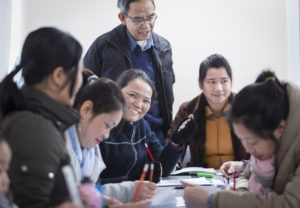Jesuit Social Services’ long-standing work supporting the settlement of newly arrived communities is based on our belief that all new arrivals to Australia deserve a chance to flourish.
For over 40 years Jesuit Social Services has been engaging effectively with successive waves of new migrant groups to improve personal resilience and build a strong sense of belonging and social cohesiveness.
More recently, refugee and asylum seeker issues have become increasingly divisive and Australia’s treatment of refugees has rarely been far from the headlines. In Victoria, recent media coverage of youth crime has reignited debate around migration and and the rights and responsibilities of newly arrived communities.
The highly politicised and inflammatory reports of ‘African youth crime’, which include calls for more punitive responses, have fanned the flames of fear surrounding this contentious issue.
This coverage stands in stark contrast to what we know works to improve social cohesion and achieve positive migrant outcomes.
Jesuit Social Services supports the need for people to be held accountable for their actions, and we also know that preventative approaches that engage constructively with local communities are the most effective way to tackle the issue.
Strong leadership is required at all levels of government to deliver a response that unites the community in a shared approach to ensure a safe and thriving society.
Late last year, the Joint Standing Committee on Migration concluded its Inquiry into migrant settlement outcomes which focussed on many of these issues. Jesuit Social Services was given the opportunity to respond and present our submission to the Committee in early 2017.
In our submission, we acknowledged some of the pre-arrival challenges faced by newly arrived migrants, such as learning English and barriers to employment. We also focused on the importance of strengthening social cohesion to ensure positive migration outcomes.
The Committee’s final Report – No one teaches you to become an Australian – made a number of promising recommendations, including increasing the accessibility of English language classes and improving housing opportunities for newly arrived migrants.
However, the undue focus on specific migrant communities, as well as the suggestion that mandatory visa cancellations be expanded (potentially impacting migrants under the age of 18) were particularly concerning.
Provocative and damaging rhetoric (as seen in the media coverage of African crime in Victoria), and the dangerous recommendations of the Committee that are currently under Government consideration, undermine the foundations of our long-standing work with African communities.
Programs such as our African Australian Inclusion Program, run in partnership with NAB, and our Settlement Program have promoted meaningful engagement and supported settlement for African community members. These programs provide successful role models and mentors to support people into meaningful activities such as education and employment.
Expanding programs that offer early intervention, prioritising youth aged 10-14, would assist in halting the well-worn path that many young people take into the justice system after disengaging from school, family and the wider community.
Settlement is an individualised, complex and lifelong endeavour. Some challenges will be overcome, while some will be overcome and then return; therefore our response must be adaptable and based on a person’s unique support needs. We believe the best way to strengthen social cohesion is to address issues of belonging, leadership, social justice and equality, participation, acceptance and worth.
Fundamentally, we advocate for place-based approaches that support local communities to develop their own goals and increase community participation and wellbeing. Place-based initiatives bring the community together. For new migrants, this helps people build social connections and prevents isolation. This approach also fosters belonging and engagement, giving refugees and migrants a sense of control and purpose in their lives. Building trust, belonging and community engagement are essential elements in fostering social cohesion, helping people feel safe, included and valued in society.





